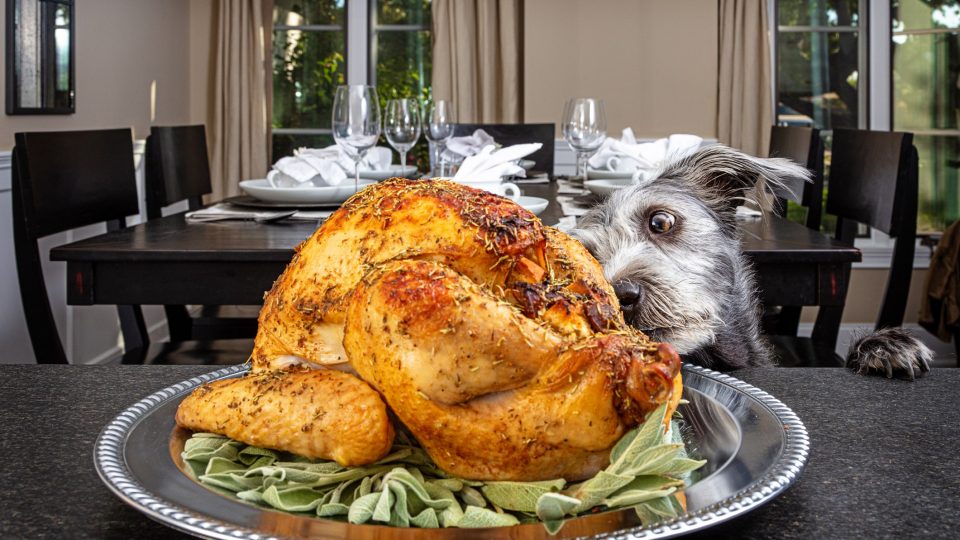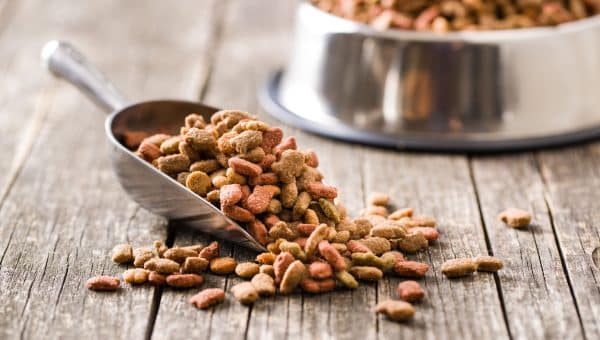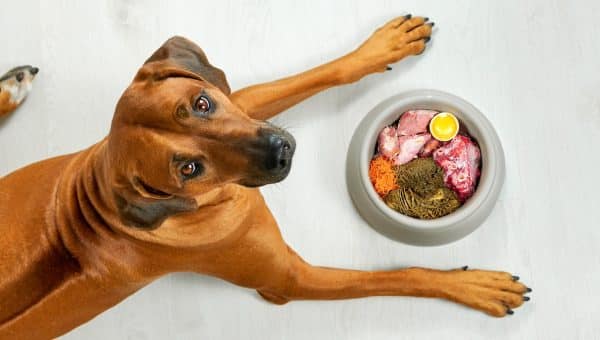- This post contains affiliate links. Read more here.
- Not a substitute for professional veterinary help.
In a recent Rover survey* of U.S. dog and cat parents, more than 81% of pet parents said they have fed their pets table scraps from their holiday meals.
But veterinary expert, Dr. Rebecca Greenstein of the Dog People Panel, explains that while “it’s tempting to give in to those puppy dog eyes, pet owners are not doing anyone any favors by sharing Thanksgiving dinner with their pets.”
“From a vet’s perspective, almost everything on the holiday menu can be irresistible—and sometimes dangerous—to our four-legged babies,” she says.
Bones can damage a pet’s mouth and throat and potentially cause damage to the gastrointestinal tract; fatty foods can upset tummies and inflame vital organs; and candy, sweeteners, and even some whole foods (such as grapes and onions) can be downright deadly for pets.
The good news is that in the same survey, pet parents said they try to do their research before giving their pet human food. 67% said they look up which foods can be dangerous.
In an effort to provide clarity about what holiday foods our pets can—and definitely can’t—have, this guide will help you navigate which Thanksgiving and holiday foods your pet can eat safely, and those you should strive to keep out of paw’s reach.
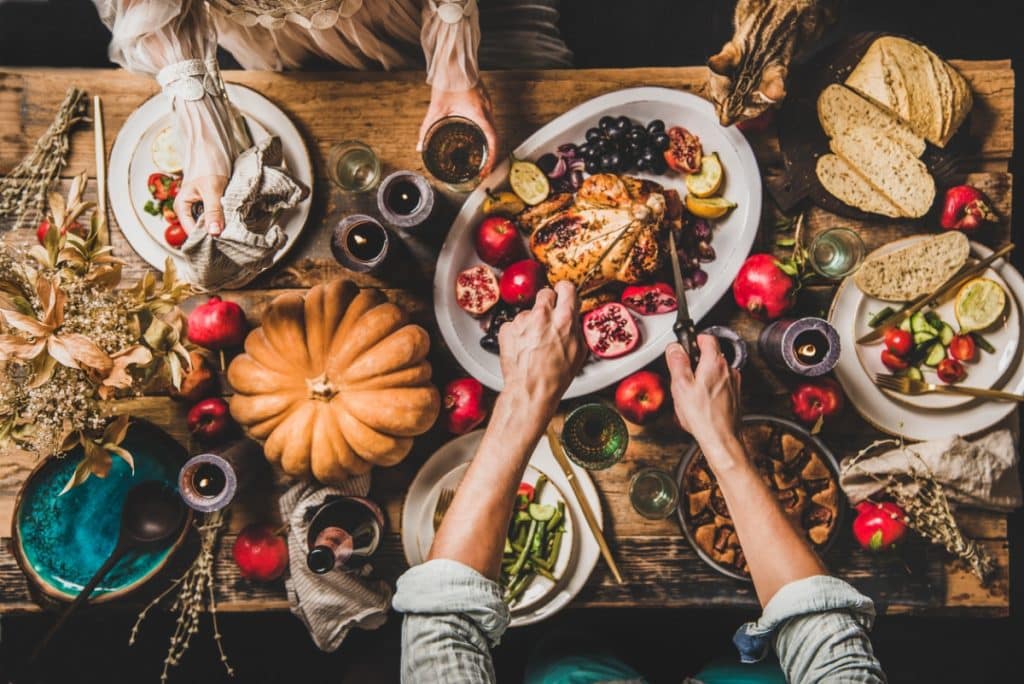
iStock/Foxys_forest_manufacture
Holiday Foods Pets Can Eat
“Although every pet parent considers their dog or cat to be a member of the family, remember that dogs are not simply small people, and cats are not simply small dogs,” says Dr. Greenstein.
“Pets can’t metabolize fats, dairy, and other nutrients and foods the way we can, and sometimes what pet owners think of as innocent table scraps can land their pets in the hospital with severe illness,” she explains.
The foods listed in the table below are common in kitchens over the holidays, but keep in mind that they are only safe for pets to eat when they are plain, and in general, in moderation as a treat. Read on for more serving notes.
| Food | Safe serving notes | OK for cats or dogs |
| Apples | Sliced, raw, or baked, no seeds or core, in bite sized pieces | Both |
| Applesauce (plain) | A lick or a spoonful, no added sugar | Both |
| Specially made-for pets broth only (with no sodium) |
Both |
|
| Carrots | Raw or cooked, in bite sized pieces, plain, without salt, fat, butter, oils, or spices | Both |
| Celery | Raw or cooked. Plain, no added fats or salt, in bite sized pieces | Both |
| Collard greens | Freshly cooked (not raw, no seasoning, or canned) and without stems. | Both |
| Cornbread (plain) | Butterless*, unseasoned, and in very small amounts only | Both, as a tiny reinforcement treat |
| Cranberries | Powdered, dried, fresh (no preservatives, spices or added sugar) | Both |
| Green beans | Fresh, frozen, cooked, or dehydrated, in bite sized pieces, without any added salt, fats, or sauces | Both |
| Okra | In small amounts, raw or cooked. Never fried. | Dogs only |
| Potatoes | Baked or boiled, never raw or fried (ex. broiled latkes are OK). Plain, no added fats or salt, in bite sized pieces | Both |
| Pumpkin | Canned, cooked, pureed, with no added salt and no added sweeteners (including xylitol), or spices (cinnamon, cardamom, anise, allspice, or other common pumpkin pie spices) | Both |
| Plantains | Serve boiled or steams. Never raw. | Both, but only a few slices for cats |
| Sweet potatoes | Plain, cooked, with no added sweeteners, salt, or spices, in bite sized pieces | Both, but in very small amounts for cats |
| Sour cream | Plain, low-fat, and in very small doses | Both, but in very small amounts for cats |
| Tamales (masa and meat only) |
Small amounts if made without garlic, onions, chilies — and without the corn husk or banana leaves |
Dogs only |
| Turkey | Cooked, skinless, boneless, in bite sized pieces, without gravy, salt, spices, or fats |
Both |
*Note: Butter is technically not poisonous for dogs and cats, so if a little gets mixed into their treat, that’s OK! Don’t panic. Just keep in mind not to make it a snack, as butter is high in fat content.
Holiday Foods Pets Can’t Eat
“Any time there are large gatherings with lots of guests, plentiful table foods, and less owner supervision of pets, we tend to see an uptick in cases coming through the vet ER,” says Dr. Greenstein.
To keep your pets out of harm’s way, Dr. Greenstein says:
- Pet parents should go out of their way to ensure that any sugar-free products in the home never contain any xylitol by checking ingredient labels carefully.
- Keep the turkey and sides well out of reach and consider confining your pet to a safer pet-proofed area with their own food and treats and toys to keep them happy and occupied.
Additionally, Dr, Greenstein says to never feed your pet the following:
- Alcohol of any kind
- Apple pie
- Artificial sweeteners such as xylitol
- Banana leafs
- Bones
- Bread or pizza dough
- Candy
- Chocolate
- Chili peppers
- Corn husk
- Dairy, including whipped cream
- Eggnog (try making this dog-friendly version instead)
- Fried foods, such as latkes, okra, pastries, buñuelos, and sufganiyot
- Garlic
- Grapes or raisins
- Gravy (try making this dog-friendly version instead)
- Green bean casserole
- Hot sauce
- Jelly and jams
- Mac and cheese
- Nuts, including macadamia nuts and walnuts
- Onions
- Pumpkin pie
- Salsa
- Salt
- Sour cream
- Yeast (see bread/pizza dough, above)
If you suspect your pet has ingested any of these foods, seek veterinary attention immediately.
Festive Pet-Friendly Treats You Can Make or Buy
Your pet can still get in on the fun with special treats you make or buy just for them. Here are some holiday favorites we recommend:
Treats for dogs:
- Hearty Sweet Potato Casserole for Dogs
- 11 Pumpkin Dog Treats to Fall For
- Homemade Pumpkin Pie Dog Treats
- The Turdoggen: A Gloriously Stuffed Butternut Squash for Dogs
- Leftover Turkey Meatballs for Dogs
Treats for cats:
- Pumpkin No Spice Latte for Cats
- “Cheesy” Holiday Cat Treats
- Push Pop Pumpkin Cat Treats: A Recipe for Fall
- The Six Best Pumpkin Treats for Cats
- Spice Up Kitty’s Holidays With the Best Christmas Cat Treats
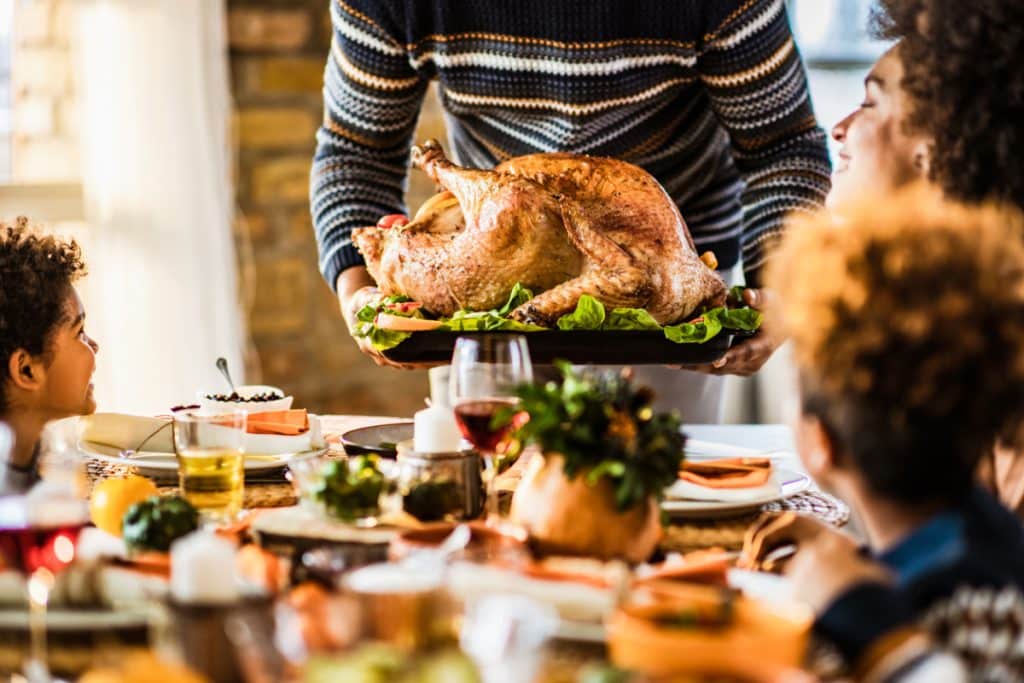
iStock/skynesher
The Takeaway
In the season of giving and celebrating, it’s only right to want to include pets in the festivities. Just remember that the abundance of holiday foods humans enjoy this time of year are not the same cornucopia for our pets.
With a little supervision and research, your pets can safely enjoy holiday foods right along with you and your family.
*Methodology: An October 2022 Rover survey of 1,000 dog and cat parents in the U.S.
